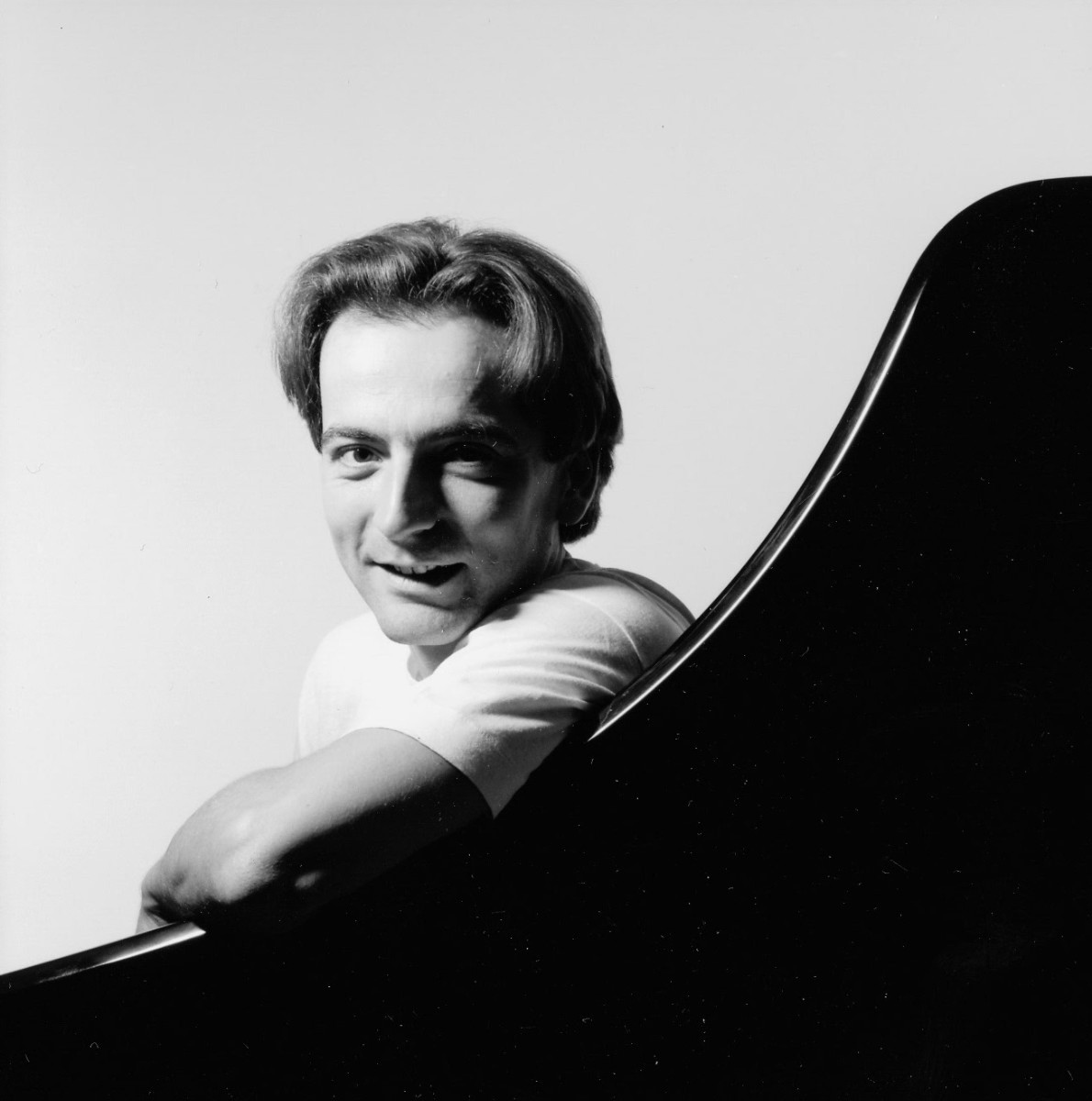PROFILE プロフィール

DENIS LEVAILLANT
Profile
「ドニ・ルヴァイヤン」by ダヴィド・サンソン
フランスの作曲家でピアニストのドニ・ルヴァイヤンは、現代のミュージックシーンでも最高の音楽家の一人に数えられる。1973年以降、ジャズのエネルギー溢れるリズムと大衆的な音楽を、フランス音楽の伝統に基づいた新しいオーケストラの色彩と融合させ、広い分野(オペラ、バレエ、オーケストラ、室内アンサンブル、合唱、ソロ、電気音響、ラジオ作品)をカバーする、オリジナルでヴァラエティに富んだ、あらゆる人々に向
けられた作品を創造し続けている。
6歳でクラシックピアノを始め、12歳でラヴェルの《高貴で感傷的なワルツ》をレコーディング。当時のピアノ教師マドレーヌ・マンジャンと共にモーツァルトの協奏曲を演奏する。彼女からは和声学、対位法などの、エクリチュールの基礎も教わった。
1970年代始めにクラシックを捨て、ダンス、ジャズ、即興演奏、サーカスに没頭する。
このような「生きた」学習期間に、後にその分野で欠かせない著作となる1980年出版の『L’Improvisation musicale (音楽即興)』の素材を引き出した。1973年には、国営ラジオ局フランス・キュルチュールのクリエーション・アトリエのために、最初のラジオ作品《Circus Virusシルキュス・ヴィリュス(サーカス・ヴィールス)》を創作している。
これをきっかけにラジオのための創作を長く続けるが、その中で、1988年には《Speakersアナウンサー》でイタリア賞のRAI賞を受賞した。平行して、1974年には哲学のマスターを取得。
1980年代初めには舞台芸術への取り組みをはじめ、独自のグループ「ブルー17」とともに、歌、演劇、マジック、楽器、照明、音響などを織り込んだ新しい形の音楽劇を創作。1983年初演の《Deux pièces à louer貸し二部屋アパート》を皮切りに、強い想像力に満ちた約15点のユニークな作品を創り出している。もっとも最近の《Un petit riendu-tout neuf まっさらの小さなとるに足らないもの》は2006年4月にパリのロン・ポアン劇場で上演された。大きな反響を呼んだ作品の中では、アメリカのジャズミュージシャン、バール・フィリップとバリー・アルシュルとのトリオで上演された《Les passagersdu deltaデルタの旅人》と、アンドレ・アンジェル演出エンキ・ビラル舞台装置で1990年にアヴィニョン演劇祭で初演されたオペラ《O.P.A. Mia》が代表作。
フランス国立視聴覚研究所のフランス音楽研究グループによる音のデジタル処理の開始に参加し、この新テクニックを楽器に応用。《Piano Transit》(1983年)から《Drama Symphony》(1995年)、《ElektroSpacePiano》(2003年)まで、常に探求を続けている。混声合唱のための《黒い石》(1984年)からは、声楽によるハーモニーとポリフォニーで独特の探求をはじめ、現在も続けている。
この時期、振付家(D.バグエ、D.プティ、C.マルカデ、B.ルフェーヴル等)や演出家(とくにアラン・フランソン)とのコラボレーションも多く手がけ、作曲家として40以上の創作に携わっている。
1983年には、フランスの最高の芸術家に与えられるヴィラ・メディチ賞を受賞。
1990年代初めはオーケストラ曲、器楽曲を主に作曲。ピアノ協奏曲《Echo de Narcisseナルキッソスのエコー》(1995年)や弦楽四重奏曲第二番《Le Clair, lʼObscur明、暗》(1997年)、オーケストラのための協奏曲《Paysages de Conteおとぎの風景》(1998年)や、カウンターテナーと混声12声部のための《Tombeau de Gesualdoジェズアルドの墓》(1994年)などが生まれている。
1995年、アンサンブル・アンテルコンタンポランとルーブル美術館は、フリッツ・ラングの最後の無声映画《月世界の女》のための音楽の作曲を依頼。1999年には再び、一夜を徹した《Eloge de la Radioラジオ礼賛》を創作。2000年にプレザンス現代音楽フェスティバルで初演された。
2002年にはパリ・オペラ座がバレエ用からオーケストラ作品《ドガの小さな踊り子》を委嘱される。2003年のガルニエ宮での初演および2005年と2010年の再演は大成功をおさめる(2010年にはヨーロッパ全土の60以上の映画館で同時中継される)。2005年には、ジャック・プレヴェールの童話によるオーケストラと語りのための《Opera dela lune月のオペラ》を作曲(フランス放送フィルハーモニー管弦楽団委嘱作品)。
2014年にはアメリカ合衆国の15の州立大学から招かれて、講演会、マスタークラス、自作演奏会などを行う。
出版編集者フレデリック・レイボヴィッツとの協力体制により、録音済みの代表作品は、世界中で、映画やテレビ番組に常に使用されている。最近では2013年のカンヌ映画祭大賞を得た『アデル、ブルーは熱い色』のサウンドトラックやリアーナのビデオ
[Official Page]
English : http://www.denislevaillant.net/DL_ENG/
Japanese : http://www.denislevaillant.net/DL_JAP/
French composer and pianist Denis Levaillant is one of today’s major musical talents.
Since 1973, this French composer and pianist, born in Paris in 1952, has managed to develop a personal, highly varied oeuvre, covering a vast range of expression (opera, ballet, symphony orchestra, chamber ensembles, choruses, soloists, electro-acoustic, radio pieces…), allying the rhythmic energy of jazz and popular musics to a new orchestral colour in the French tradition, appealing to all audiences.
He began studying the piano at the age of six, recorded Ravel’s Valses nobles et sentimentales when he was 12 and played Mozart concerti with his professor, Magdeleine Mangin, who also initiated him in the basics of writing (harmony, counterpoint…).
In the early 1970s, he abandoned the classic course, having decided to acquire the broadest possible professional experience. Fascinated by dance, jazz, improvisation and the circus, from this ‘in vivo’ training period he would draw the material for his book L’improvisation musicale (1980), which has become a reference on the subject. In 1973, he also wrote his first radio work, Circus Virus, for the Atelier de Création de France Culture, and this was the beginning of a long creative collaboration with the radio, which would lead to his winning the RAI Prize for Speakers at the Italia Prize in 1988. During the same period, he earned a Master’s in philosophy (1974).
At the beginning of the 1980s, he embarked upon the adventure of live entertainment and, with his company, Bleu 17, created musical spectacles combining singing, theatre, magic, instruments, lighting and sound in new forms. Since Deux Pièces à Louer, premiered in 1983, he has written some 18 singular shows marked by a powerful imaginative universe, up to the most recent, Un petit rien-du-tout tout neuf, first performed at the Théâtre du Rond-Point (Paris) in April 2006. Some of these have created a considerable stir, in particular Les Passagers du delta, first performed in trio with the American jazz musicians Barre Phillips and Barry Altshul, and his opera O.P.A. Mia (My Tender Bid), premie-red in 1990 at the Avignon Festival, directed by André Engel with costumes and sets by Enki Bilal.
He has enlarged his palette of expression by participating in the beginnings of digital sound treatment (at the INA-GRM, the Music Research Group of the National Audiovisual Institute), applying these new techniques to instrumental writing: from Piano Transit (1983) up to the recent ElektroSpacePiano (2003), by way of Drama Symphony (1995),
this research has remained constant in his work. With Les Pierres noires, for mixed chorus (1984), he began original research on harmony and vocal polyphony, which he has continued to go into in greater depth.
These productive years also witnessed numerous collaborations with choreographers (D. Bagouet, D. Petit, C. Marcadé, B. Lefèvre...) and stage directors (in particular, Alain Françon).
At the onset of the 1990s, he devoted most of his creative efforts to symphonic and instrumental writing, this resulting in important works such as his Piano Concerto Echo de Narcisse (1995), String Quartet No.2 Le Clair, l’Obscur (1997), Concerto for Orchestra Paysages de Conte (1998) and the Tombeau de Gesualdo, for counter-tenor and 12 mixed voices (1994).
In 1995, the Ensemble Intercontemporain and the Louvre commissioned him to write music for Fritz Lang’s last silent film, Frau im Mond. In 1999, he created a new full-length spectacle, Eloge de la Radio, first performed at Radio France’s ‘Présences’ Festival in 2000.In 2005, he composed l’Opéra de la lune, for orchestra and narrator, based on a story by Jacques Prévert.
In 2002, the Paris Opera commissioned a symphonic ballet, La Petite danseuse, which met with great success at the Paris Opera in 2003 and has been revived in 2005 and 2010. In 2014 he was composer in residence in fifteen State Universities in USA, for lectures, master classes and concerts.
His collaboration with publisher Frédéric Leibovitz allowed him to see most of his catalogue recorded and regularly synchronized in television and films the world over: most recently, he had music synchronized in Blue is the warmest Colour (Palme d’Or at the 2013 Cannes Festival) and in the Rihanna’s video Bitch Better Have My Money (2015)
[Official Page]
English : http://www.denislevaillant.net/DL_ENG/
Japanese : http://www.denislevaillant.net/DL_JAP/